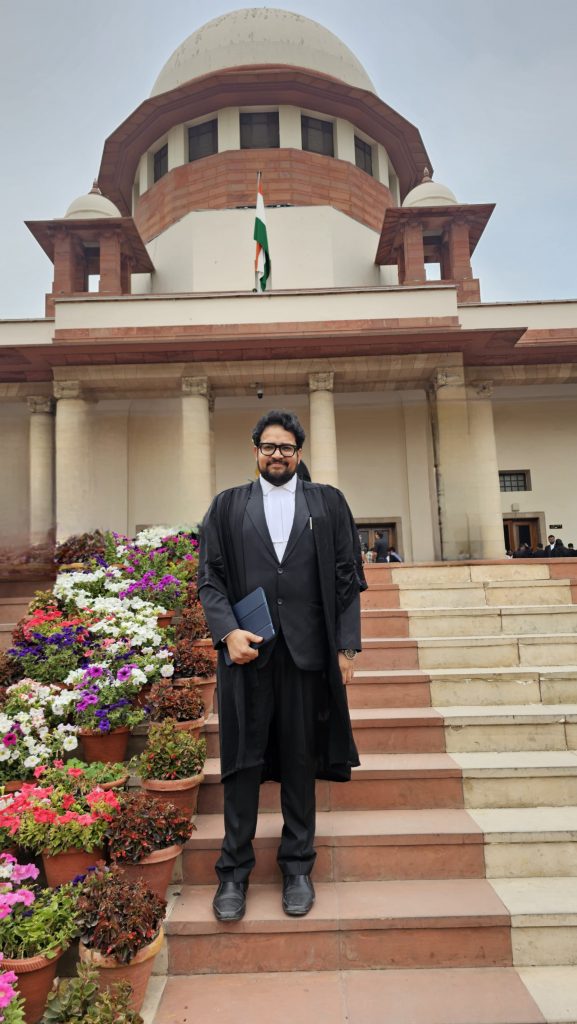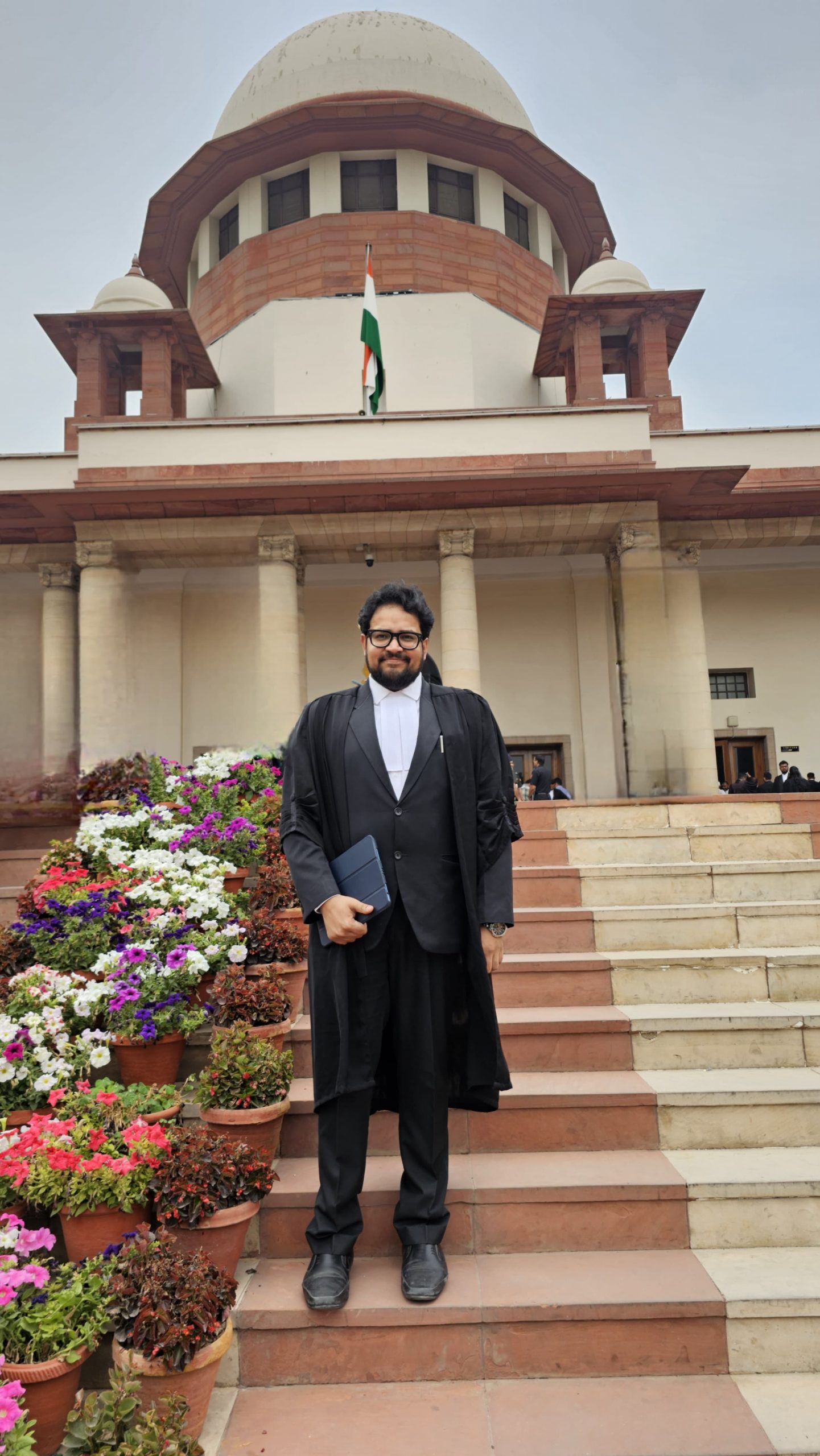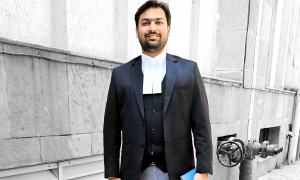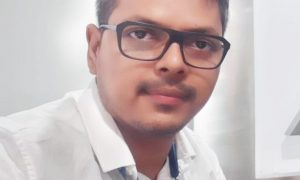This interview has been published by Namrata Singh and The SuperLawyer Team

Could you share with us the pivotal moment or series of events that led you to pursue a career in law? Additionally, how has the support of your family influenced your journey, and what challenges did you encounter during your formative years in the legal profession?
I got acquainted with law quite early in my life. My father laid down the foundation of law in our family. During my school days, my father picked me up after school and I used to spend time at his office – Central Agency, Supreme Court of India before heading back home. So, since class IV, I have been visiting the Supreme Court. After completing my school education, I pursued law for graduation and the interest developed. I kept pestering my father about the legal propositions and understanding of judgments. His library became my favourite place to put what I was taught to test. The like came but love happened later. I joined the chambers of Shri Uday U. Lalit (later elevated as Judge of Hon’ble Supreme Court of India and appointed as Chief Justice of India) firstly as an intern and then as a junior, I saw him mastering the art of reading thick paper-books, applying the legal principles and arguing the matter the next day with utmost precision. Over the years I fell in love with the profession.
My family, especially my father, kept pushing me to venture out of his office and explore the diversity which the profession carries. So I developed the habit of sitting in court and observing seniors argue the matters, preparing notes, noting down judgments advanced and later waiting to read that judgment whenever pronounced. I recollect that sometime in 2012-13 I was in Court No. 2 (Supreme Court) and a trademark suit was being heard at its appellate stage about a matrimonial site saying the other one infringed its right. As the question involved online infringement the Ld. A Senior Advocate assisting the court was asked a question as to how the claim is maintainable. Though I was a mere spectator it clicked me to online search on my mobile phone and see what happened and there it was. I explained it to his associate, the senior was impressed immediately and handed the mobile phone to Hon’ble Judges who noticed the issue and granted relief. These experiences keep pushing you and help you think on your feet.
This profession is a hard task master in many ways. One has to keep learning and being updated about the judicial pronouncements while simultaneously managing clientele and keeping the ethics above all. I find the legal profession to be enthralling and at the same time keeping you resilient.
Your reported judgments span various legal domains. Could you share a particularly memorable case and the legal principles it involved?
There are a few, but I guess I have to refer to Awadhesh Kumar v. State of Uttar Pradesh reported as (2019) 10 SCC 323 wherein the High Court had erred in applying Exception 4 to Section 300 IPC and set aside the judgment passed by Trial court which had found the accused guilty under 302 IPC. The accused persons tried to kill the mother of complainant Awadhesh Kumar (whom I was representing) and a case was initially registered under Sections 307, 504, 506/34 IPC, however, subsequently on the death of Awadhesh’s mother, the case was converted into one under Section 302 IPC. The Trial court had found it to be fit case for 302 IPC and had passed life sentences against one of them and acquitted the other three. The convicted accused moved the High Court which modified the conviction to Section 304 Part I IPC sentencing him to 10 years rigorous imprisonment. I filed a Special Leave Petition on behalf of the complainant, who was not a party before the Trial court or the High Court. My submission was that the High Court committed a grave error in modifying the conviction from that of Section 302 IPC to that of under Section 304 Part I IPC as exception 4 to Section 300 IPC would be attracted only when there is a fight or quarrel which requires mutual provocation and blows by both sides in which the offender does not take undue advantage. Hon’ble Supreme court allowed my appeal and set aside the judgment passed by High Court and modified the conviction from Section 304 Part I IPC to Section 302 IPC and the accused were directed to surrender before the Court concerned to undergo life sentence as was imposed by the trial court.
Mr. Awadhesh had tears in his eyes when the judgment was passed as the accused almost got away with his crime but was finally brought to justice.
As someone who successfully cleared the Advocate-on-Record Examination, could you shed some light on the preparation process? What strategies or resources did you find most helpful in preparing for such a rigorous exam?
This I get to answer a lot. The daily court grinding works as a manure and itself becomes part of preparation. If you are regular to the Supreme Court and involve yourself in all the process, right from researching to preparation to drafting to filing, listing and arguing the matter, you are already preparing yourself for the examination.
I guess the difficult part isn’t the examination itself but the transition from a professional to a student all in the same day as you have to do everything above mentioned during work hours and study like a student during the rest of the day.
To the advocates taking this exam, I would suggest taking your time but read thoroughly the Supreme Court Rules, Leading cases, Bar council rules and practice writing as by the time you are preparing for the exam this habit starts fading away.
Beyond your legal career, you’ve been involved in guest lectures and events related to broader societal issues. How do you see your role as a legal professional intersecting with your broader interests and social responsibilities?
As a person practicing law, you automatically become an activist fighting for a cause, a critic of the government, a benefactor of humankind and with it comes responsibilities. I had the privilege of being invited on women’s day to speak on ‘Women Laws in India’ at an event hosted by Vayu Sanginis (Indian Air Force). Amongst the guest lectures, I recollect one at Rashtriya Raksha University, Gandhinagar, Gujarat which was an enriching experience speaking on the topic of Legal Dimensions of Serial Killers.
During the legal rigmarole, we come across certain individuals who are in need of justice but are economically weak and by default I try helping at least a few by taking up cases pro bono. So, whenever I am approached to educate or help someone needy, I try to serve the society with my limited knowledge.
See we are called ‘officers of the court’ and our foremost duty is towards the court and so the demeanour of a lawyer outside court is more important than his obvious humility towards court. It is our collective duty to allocate time while being committed to the cause.
How does the role of an Advocate-on-Record differ from other legal positions, and what unique responsibilities does it entail? Also what are some common misconceptions about the Advocate-on-Record role, and how would you clarify or debunk them?
The Supreme Court Rules provide for an Advocate-on-Record to plead and file an appearance or act for a party in the Supreme Court of India. The rules further say that no advocate other than an advocate-on-record can appear and/or plead before the Supreme Court unless instructed by an Advocate-on Record. So yes, as you become the natural pleader before the Supreme Court, it is a big responsibility.
Misconceptions are quite a few and I would address one of the most common of them: that only Delhi NCR based lawyers can appear in the AOR exam, this is so far from the truth. Any advocate enrolled with the bar council of any state and having completed four years at the bar and having undergone training from an Advocate-on-Record of at least 10 years standing is eligible to appear in the examination. Yes, having an office within 16 km radius of the Supreme Court and appointing a registered clerk comes later but if one is keen on taking up the exam and practicing before the Supreme Court, this is a given.
Outside of your legal profession, what hobbies or personal interests do you pursue to unwind yourself?
I am glad you asked this, as most people think lawyers are hermits. Someone said that it is very necessary to have vices. The legal profession is daunting and requires passionate commitment but unwinding becomes a necessity to give tranquility to the otherwise pandemonium-infused mind. I love to travel, watch movies and I have an ear for music. During my college years I used to do weightlifting for fun and then couldn’t carry on but I recently developed a penchant for weightlifting. I feel it provides peace and relaxes the brain. My wife and I often play badminton in the evenings.
Given your experience, what advice would you give to young lawyers aspiring to practice at the Supreme Court level or aiming to become an Advocate-on Record?
Equip yourself with the knowledge, experience and procedure as much as you can. Young lawyers often think about practicing directly before the Supreme Court, me included, nothing wrong in it. But from my experience I can say that the command on law required at the Supreme Court is at a much higher pedestal. It would not be wrong to say that there is no scope for error. So, my advice to upcoming advocates would be what I actually did. That is to work with an advocate who appears regularly before the Supreme Court for some time. Later find a chamber which allows you to hone up your skills. And finally associate yourself with a senior who lets you argue to again develop that art too. I am grateful to my father and Shri Santosh Kumar Tripathi (Standing Counsel, Delhi High Court) who helped me develop that art.
As a law officer for the Government of Uttar Pradesh, could you shed some light on the specific duties and responsibilities that come with your role, and how these duties contribute to the effective functioning of the government and the administration of justice?
As I have said earlier, assisting the court is our primary duty and being a lawyer, you become a critic of the policies of the government. Being a law officer, one has to walk the sharp sword of fulfilling both the responsibilities. A lawyer appearing for a State or any institution bears the load of conveying the cause behind the action brought in question by the litigant and in some cases bringing justice where the State acts as a bridge to the society.
The balance of power is needed for effective functioning of the government and there comes the administration of justice, we lawyers in our duty as law officers for the government serve as the escapement ensuring that the wheels never collapse and there is a constant transmission between the government and the justice system.
You’ve experienced both independent practice and working within legal teams. What differences do you notice between the two, and do you find yourself missing aspects of teamwork when working independently, or vice versa? How do these experiences shape your approach to collaboration and autonomy in your legal practice?
Litigation itself involves at least three heads, the applicant, the defendant and the judge. We three work together to bring justice to the aggrieved. Now each of the three heads have their own way of working and have a team which helps them fulfill their tasks. So independent practice basically means where you are heading the show and working within a legal team may or not necessarily mean spearheading. No doubt working with a legal team supplements your approach towards a case but if you are not the decision maker sometimes you just wonder whether there could have been a different outcome. Working independently, you have that liberty albeit risk to proceed forward with your school of thought.
Get in touch with Siddharth Krishna Dwivedi-
























